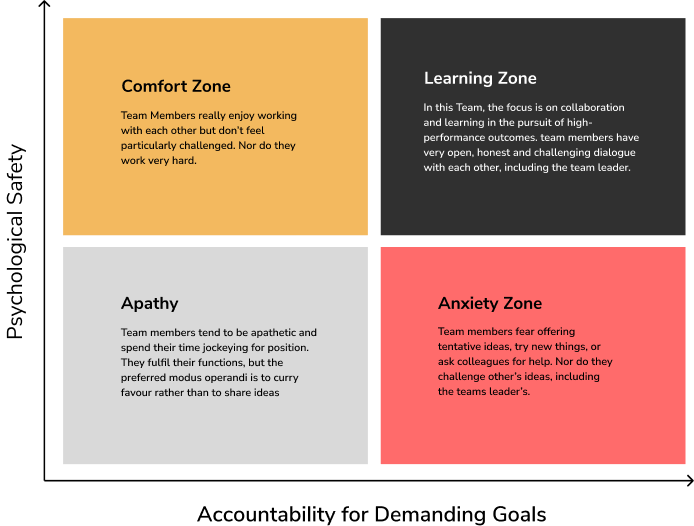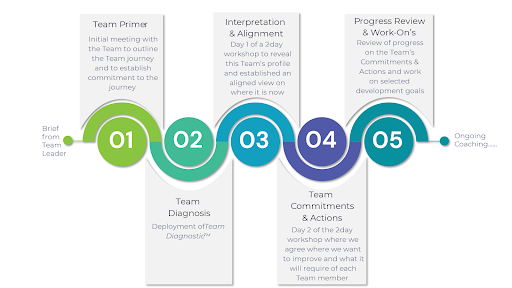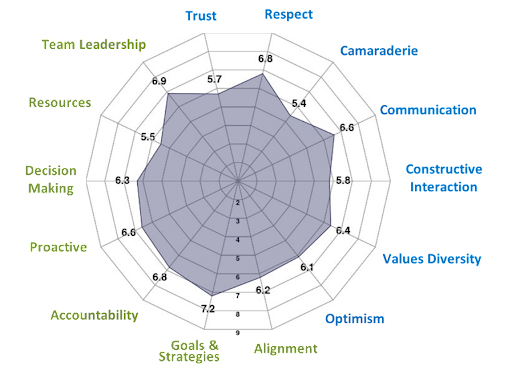Executive Team Coaching

Adapted from Edmondson, A. (2008). The Competitive Imperative of Learning. HBR. July-August 2008.
How is your Team doing? Some questions to ask yourself
If you’d like to start thinking about how things are in your Team, consider your Team and answer these questions:
- Real Teams are Interdependent; as well as personal or functional objectives, they have clear shared objectives that require the whole team’s active engagement. Ask yourself, what is the nature of my Team’s interdependency? What is it that we do together, that we cannot do apart?
- In High-Performing Teams, team members hold each other accountable. Do you see and hear team members holding each other accountable? Or do they look to you, their leader, to do that?
- It’s safe in a High-Performing Team to speak your mind and challenge each other’s thinking, including the Team Leader. Ask yourself this…..Is it safe for Team members to openly challenge my thinking or offer alternative views (to mine) when we’re together as a Team?
- Real Teams enjoy working and spending time together. Does this Team exhibit camaraderie?Is there a sense of belonging and fun in this Team?
- In High-Performing Teams, diversity is valued and regarded as essential to better decision-making, innovation, etc. not as a source of conflict. Are all voices welcomed and heard on this team? Or are views that go against the group’s thinking discouraged or dismissed?
- Trust is a critical quality of High-Performing Teams. Trust may exist between individuals on the Team, but real Trust must exist as a Team capacity. So, can you count on each other? Do you all have each other’s back? Or does the Team operate in a fear-based environment?
- Psychological Safety. Amy Edmondson’s work has really helped us to understand the importance of Psychological Safety and how Team leaders can help to cultivate the safety to speak one’s mind. Consider the matrix to the left and ask yourself this…Where would I stand on this matrix, if I were to show where this Team is? What would it take to shift my Team further into the Learning Zone?
The Executive Team Coaching Process
The team coaching engagement starts with a brief from the client (the Team Leader) followed by a Team Primer where the Team meets with Phillip to discuss the true nature of Teams and High-Performing Teams. The discussion also covers the process of Team Coaching and what is required of the group. The objective of this brief (c. 45/60mins) discussion is to get an early sense of where this team is, give them some ideas around how they can improve, a clear picture of the journey, and to build commitment to doing the work.
All of my assignments involve some form of Team Diagnostic, to help us build a coherent picture of where this Team is right now and where it needs to focus its attention in order to improve. My preferred choice is Team Coaching International’s (TCI) Team Diagnostic™. The tool provides the team with a rich set of data giving them a clear picture of where they are strongest and where they will need to improve. The team themselves will identify which performance parameters they wish to work on during the engagement; the work is conducted through the real work of the team, and measured against the team’s real-world business, operational and/or strategic objectives, KPI’s, etc.
The objective is to effect a tangible return on the investment; to show measurable impact. TCI’s data, gleaned from working with over 1,000 teams since its inception reveals that only 10% of teams see themselves as ‘High-Performing’…. that’s a lot of opportunity for improvement and a lot of opportunity to generate tangible benefits for the organisation.
What is the TCI Team Diagnostic™
The Team Diagnostic™ model is built on a two-part premise:
- Teams exist to produce results. The nature and measure of the results will vary from team to team, but ultimately all teams will be evaluated on their ability to produce results over time.
- The way team members interact with each other influences the quality and output of results.
The environment in which team activity takes place, plays a crucial role in determining how sustainable team productivity can be. The mood of the team — whether energised and motivated, or fearful and disengaged — is the air the team breathes. That atmosphere is created through relationships on the team.
The system of a team exists as a culture with unwritten rules, expectations, beliefs, values, approved behaviour and taboos.
The Team Diagnostic™ allows the team to assess where it is strongest and where it is weakest across 14 separate team competencies, across two broad strengths:
Productivity strengths support the team to achieve results, accomplish tasks, and stay on course to reach goals and objectives. The Team Diagnostic™ model identifies seven qualities necessary for teams to achieve high performance.
Positivity strengths focus on the interrelationships between team members and the spirit or tone of the team as a system. The strengths are drawn from a number of research sources including Appreciative Inquiry, Emotional Intelligence, Positive Psychology, and academic research into relationships that work.


The Team Diagnostic™14Team Competencies[Productivity in Green & Positivity in Blue](Team Diagnostic™is a registered trademark of Team Coaching International Inc)
To effectively coach the team as a system, team coaches start by bringing to light“the way”team members currently do things on the team. The job of the coach is to reveal the team system(way of working)to itself. The power of theTeam Diagnostic™assessment is the way it mirrors back the team’s own self-portrait. TheTeam Diagnostic™report is a graphic snapshot of a team’s system atone point in time.The methodology engages the team in intense interaction with each other about the picture they painted of themselves. In the simplest terms, we (Team Coaches) say to the team,“This is how your team looks. How is that working for you? What is it you want to acknowledge? What would you like to change?”
How long is a typical Team Coaching assignment?
A typical Team Coaching engagement may run for c. 12 months; but some teams are anxious to compress the timelines to c. 6 months due to critical time pressures.
Testimonials
“I have worked with Phillip in the capacity of a high-performance team journey with my executive committee for approximately 1 year. He has supported us in the following ways:
- Onboarding new team members with ease
- Getting a clear team contract
- Building trust and transparency
- Creating a safe psychological space
- Encouraging constructive conflict
- Agreeing commitments and holding each other to account
I have found the experience both highly progressive and safe. He has encouraged me to try new techniques with my team and has helped us to find our most authentic selves whilst giving deep constructive feedback to one another. I would recommend Phillip to any leader or team who is looking for a trusting partner who will offer techniques, structure, guidance but ultimately enable the team to find their own answers in the safest yet most constructive way. He is always thoroughly prepared for our sessions and yet is very agile and allows the team to decide in the moment how best to orientate. We have progressed in a big way thanks to Phillip.”
Carol Robert – COO Suntory Food & Beverage GB&I
“The Suntory Beverage and Food GB&I Marketing leadership team employed Phillip just over 12 months ago to support us with on a journey to build our muscle as a high performing team. He took the time to get to know the team, the dynamics and understand what we were looking to achieve. His approach is a mix of theory but more importantly practice. He has supported us with a variety of tools including surveys to understand our baseline and track improvement, role plays, and trust exercises tailored to the areas we wanted to focus on. The journey we have been on has been hugely successful, we have grown as a team, improved individual and group trust, ways of working and productivity and had a lot of fun along the way. Phillip’s style is put everyone in the team at-ease from day 1, he is insightful and reflective but keen to challenge and move things forward which he has certainly done!”
Hannah Norbury - Director of Marketing Suntory Food & Beverage GB&I